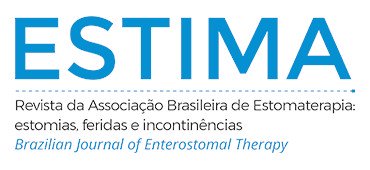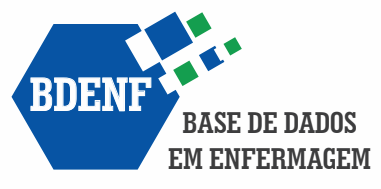Atuação de enfermeiros estomaterapeutas na fasciíte necrosante e na síndrome de Fournier
Resumo
Objetivo: Conhecer a atuação do enfermeiro estomaterapeuta na fasciíte necrosante, por meio da análise de artigos científicos. Método: Trata-se de revisão integrativa, que respondeu à questão: Quais são as evidências científicas sobre a atuação do enfermeiro estomaterapeuta na síndrome de Fournier e fasciíte necrosante? Os descritores foram selecionados da Medical Subject Headings Section, Descritores em Ciências da Saúde e Cumulative Index to Nursing and Allied Health Literature Subject Headings. Realizou-se levantamento bibliográfico de artigos científicos na Excerpta Medica Database, Medical Literature Analysis and Retrieval System Online, Scopus, Science Direct e Cumulative Index to Nursing and Allied Health Literature, consultadas até maio de 2023. Resultados: Foram incluídos 33 estudos, e as principais intervenções identificadas nos estudos foram assim categorizadas: 1) Cuidados com a lesão; 2) Tratamento; 3) Sinais de alerta; 4) Atenção à pessoa; 5) Terapias adjuvantes e; 6) Processo de trabalho do enfermeiro e da equipe de enfermagem. Conclusão: Foi possível identificar as principais intervenções do enfermeiro estomaterapeuta e sua importância na assistência de pessoas com fasciíte necrosante, pois suas intervenções abrangem desde cuidados diretos com a lesão até a atenção integral à pessoa, bem como o estabelecimento de um processo de trabalho interprofissional.
Downloads
Métricas
Referências
Antuña VL, Puchades F, Tapial JM, Ribelles JC, Sanz F, Tamarit JJ. Eosinophilic fasciitis following SARS-CoV-2 vaccination. JAAD Case Rep. 2023;36:11-4. https://doi.org/10.1016/j.jdcr.2022.11.038
Vlaic J, Fattorini MZ, Dukaric N, Tomas D. Proliferative fasciitis: a rare cause of disturbances in an adolescent hand. Acta Orthop Traumatol Turc. 2020;54(5):557-60. https://doi.org/10.5152/j.aott.2020.19033
Gomes P, Recchioni C, Vieira, WL, Canôas RS, Daruje R, Ramacciato J. Fasciíte necrosante cervical em adolescente: relato de caso. Braz J Develop. 2020;6(8):60473-81. https://doi.org/10.34117/bjdv6n8-456
Souza FSL, Gomes FC, Valle NSB, Coelho EE. Assistência de enfermagem ao portador da síndrome de Fournier: uma pesquisa integrativa. Braz J Surg Clin Res. 2019;26(2):54-62.
Santos EI, Vale ALVV, Reis ICPM, Neves PB, Pontes CM, Camara SGC. Brazilian scientific evidence on Fournier 's gangrene. Rev Rene. 2014;15(6):1047-55. https://doi.org/10.15253/2175-6783.2014000600019
Salcido RS. Necrotizing fasciitis: reviewing the causes and treatment strategies. Adv Skin Wound Care. 2007;20(5):288-93; quiz 294-5. https://doi.org/10.1097/01.ASW.0000269317.76380.3b
Soares TH, Penna JTM, Penna LG, Machado JA, Andrade IF, Almeida RC, et al. Diagnóstico e tratamento da Fasciíte Necrotizante: relato de dois casos. Revista Médica de Minas Gerais. 2008;18(2):136-40.
Rosich Soteras A, Serrahima Mackay A, Borràs-Maixenchs N, Arcarons Martí J. Catheter related necrotizing fasciitis in hematological patients: case report and implications for nursing. Ann Oncol. 2019;30(Suppl 5):843. https://doi.org/10.1093/annonc/mdz276.028
Elliott D, Kufera JA, Myers RA. The microbiology of necrotizing soft tissue infections. Am J Surg. 2000;179(5):361-6. https://doi.org/10.1016/s0002-9610(00)00360-3
Timmons J. Necrotizing fasciitis in primary care: presentation, risk factors and treatment. Br J Community Nurs. 2004;9(9):S16-24. https://doi.org/10.12968/bjcn.2004.9.Sup3.15942
Fritzsche SD. Soft-tissue infection: necrotizing fasciitis. Plast Surg Nurs. 2013;23(4):155-9. https://doi.org/10.1097/00006527-200323040-00003
Suijker J, Zheng KJ, Pijpe A, Nasroe F, Meij-de Vries A. The skin-sparing debridement technique in necrotizing soft-tissue infections: a systematic review. J Surg Res. 2021;264:296-308. https://doi.org/10.1016/j.jss.2021.03.001
Vallejo AC, Carrasco RG, Fernández MAM. Utilización de un sistema de derivación fecal en una paciente que desarrolla una fascitis necrotizante de la zona génito-perineal en una unidad de traumatología. Enferm Clín. 2010;20(6):370-3. https://doi.org/10.1016/j.enfcli.2010.07.007
Fink A, DeLuca G. Necrotizing fasciitis: pathophysiology and treatment. Dermatol Nurs. 2002;14(5):324-7. PMID: 12430520.
Carbonetti F, Carusi V, Guidi M, David V. Necrotizing fasciitis: a comprehensive review. Clin Ter. 2015;166(2):e132-9. https://doi.org/10.7417/CT.2015.1836
Egerod I, Knudsen VE, Andersson AE, Fagerdahl AM. Patient and family experience 2 years after necrotizing soft‐tissue infection: a longitudinal qualitative investigation. J Adv Nurs. 2023;79(8):2924-35. https://doi.org/10.1111/jan.15535
Heerschap C, Duff V. The value of nurses specialized in wound, ostomy, and continence: a systematic review. Adv Skin Wound Care. 2021;34(10):551-9. https://doi.org/10.1097/01.ASW.0000790468.10881.90
Souza MT, Silva MD, Carvalho R. Integrative review: what is it? How to do it? Einstein (São Paulo). 2010;8(1):102-6. https://doi.org/10.1590/S1679-45082010RW1134
Karino ME, Felli VEA. Evidence-based nursing: advances and innovations in systematic reviews. Ciência, Cuidado e Saúde. 2012;11:11-5.
Harrington DH, Lenahan CM, Sanders RM. A practitioner's guide to necrotizing fasciitis. Nurse Pract. 2015;40(4):48-54; quis 54-5. https://doi.org/10.1097/01.NPR.0000461947.30915.0c
Gillen PB. Necrotizing fasciitis: early recognition and aggressive treatment remain important. J Wound Ostomy Continence Nurs. 1995;22(5):219-22. https://doi.org/10.1097/00152192-199509000-00008
Astorino T, Genrich I, Macgregor L, Victor CS, Eckhouse DR, Barbour L. Necrotizing fasciitis: early detection may save your patient´s limb. Orthop Nurs. 2009;28(2):70-6; quiz 77-8. https://doi.org/10.1097/NOR.0b013e318199ecb4
Magel DC. The nurse's role in managing necrotizing fasciitis. AORN J. 2008;88(6):977-82; quiz 983-6. https://doi.org/10.1016/j.aorn.2008.08.014
Purnell D, Hazlett T, Alexander SL. A new weapon against severe sepsis related to necrotizing fasciitis. Dimens Crit Care Nurs. 2004;23(1):18-23. https://doi.org/10.1097/00003465-200401000-00006
Schroeder JL, Steinke EE. Necrotizing fasciitis--the importance of early diagnosis and debridement. AORN J. 2005;82(6):1031-40. https://doi.org/10.1016/s0001-2092(06)60255-x
Ferreira MC, Tuma Júnior P, Carvalho VF, Kamamoto F. Complex wounds. Clinics. 2006;61(6):571-8. https://doi.org/10.1590/S1807-59322006000600014
Fodel LP, Smith AM. Necrotizing soft tissue infections: a review of diagnosis, management, and implications for NP practice. J Nurse Pract. 2014;10(4):245-8. https://doi.org/10.1016/j.nurpra.2014.01.003
Ruth-Sahd L, Gonzales M. Multiple dimensions of caring for a patient with acute necrotizing fasciitis. Dimens Crit Care Nurs. 2006;25(1):15-21. https://doi.org/10.1097/00003465-200601000-00005
Guevel LH, Shifrin MM. Necrotizing fasciitis in the adult patient: implications for nurse practitioners. J Nurse Pract. 2020;16(5):335-7. https://doi.org/10.1016/j.nurpra.2020.02.008
Jones EG, El-Zawahry AM. Curative treatment without surgical reconstruction after perineal debridement of Fournier's gangrene. J Wound Ostomy Continence Nurs. 2012;39(1):98-102. https://doi.org/10.1097/WON.0b013e31823fe212
Alves AMRS, Morais JLP, Nóbrega LMB, Lima KA, Rodrigues FA, Oliveira JS, et al. Gangrena de Fournier: conhecimento de enfermeiros sobre a doença e suas experiências no cuidado aos pacientes. Enferm Bras. 2002;21(4):375-87. https://doi.org/10.33233/eb.v21i4.4805
Cano A, Wigoda P. State-of-the-art adjuncts in the treatment of necrotizing fasciitis improves survivability and cosmesis. J Wound Ostomy Continence Nurs. 2007;34(3):S9. https://doi.org/10.1097/01.WON.0000270862.84535.16
Özşaker E, Yavuz M, Altınbaş Y, Kozë BS, Nurülke B. The care of a patient with Fournier's gangrene. Ulus Travma Acil Cerrahi Derg. 2015;21(1):71-4. https://doi.org/10.5505/tjtes.2015.22735
Bashford C, Yin T, Pack J. Necrotizing fasciitis: a model nursing care plan. Medsurg Nurs. 2002;11(1):37-42; quis 43. PMID: 11901612.
Santos AA, Silva FCL, Souza KRF, Póvoas FTX, Bastos MLA, Lúcio IML. Assistência de enfermagem a puérpera com fasceíte necrotizante: relato de experiência. Rev Enferm UFPE on line. 2013;7(4):1248-53. https://doi.org/10.5205/r euol.3188-26334-1-LE.0704201323
Mondragón-Gómez S, Jiménez-Utrilla J. Proceso de atención de Enfermería a pacientes con gangrena de Fournier. Enferm Univ. 2013;10(2):58-66.
Symonds H. The community nurse's role in early identification of necrotising fasciitis: raising awareness. J Community Nurs. 2018;32(3):45-9.
Skacel C, Boyle M. A five year review of anaerobic, necrotizing soft tissue infections: a nursing perspective. Aust Crit Care. 1992;5(4):15-7, 18-20. https://doi.org/10.1016/s1036-7314(92)70064-2
Durham LM. Necrotising fasciitis--the importance of both evidence-based nursing care and reflective practice. Journal of Stomal Therapy Australia. 2015;35(4):12-4.
Foster L, Smith E, Moore P, Turton P. The use of a hydrofiber dressing in fulminating necrotizing fasciitis. Br J Nurs. 2001;10(11 Suppl):S36-8, S41-2. https://doi.org/10.12968/bjon.2001.10.Sup2.12343
Cruz RAO, Andrade LL, Arruda AJCG. Produção científica sobre gangrena de Fournier e os cuidados de enfermagem: revisão integrativa. Rev Enferm UFPE on line. 2016;10(5):4329-35. https://doi.org/10.5205/1981-8963-v10i5a11180p4329-4335-2016
Pour SM. Use of negative pressure wound therapy with silver base dressing for necrotizing fasciitis. J Wound Ostomy Continence Nurs. 2011;38(4):449-52. https://doi.org/10.1097/WON.0b013e31821e43f1
Meekul J, Chotirosniramit A, Himakalasa W, Orrapin S, Wongthanee A, Pongtam O, et al. A randomized controlled trial on the outcome in comparing an alginate silver dressing with a conventional treatment of a necrotizing fasciitis wound. Int J Low Extrem Wounds. 2017;16(2):108-13. https://doi.org/10.1177/1534734617701051
Niehuser ME. Negative pressure therapy dressing application in a patient with Fournier's gangrene. J Wound Ostomy Continence Nurs. 2008;35(3):S19. https://doi.org/10.1097/01.WON.0000319303.21186.53
Moorman S. Surviving life-threatening illness: keys to optimal nursing care. J Christ Nurs. 2010;27(1):18-24; quiz 25-6. https://doi.org/10.1097/01.cnj.0000365985.95141.3d
Gully S. Nursing management of necrotising fasciitis. Nurs Stand. 2022;16(52):39-42. https://doi.org/10.7748/ns2002.09.16.52.39.c3265
Gwyn L. A divine encounter. J Christ Nurs. 2012;29(3):178-9. https://doi.org/10.1097/cnj.0b013e3182579951
Mota CMG, Borges JA, Araújo AKL, Batista NJC. Atuação do enfermeiro na prevenção da gangrena de Fournier: atenção à saúde do homem. Enfermagem. 2014;13(4):242-8.
Melnyk BM, Fineout-Overholt E. Evidence-based practice in nursing & healthcare: a guide to best practice. Philadelphia: Lippincott Willians & Wilkins; 2022.
Page MJ, McKenzie JE, Bossuyt PM, Boutron I, Hoffmann TC, Mulrow CD, et al. A declaração PRISMA 2020: diretriz atualizada para relatar revisões sistemáticas. Rev Panam Salud Publica. 2022;46:e112. https://doi.org/10.26633/RPSP.2022.112
Ferreira E, Lucas R, Rossi LA, Andrad, D. Dressing of burned patients' wounds: a literature review. Rev Esc Enferm USP. 2003;37(1):44-51. https://doi.org/10.1590/S0080-62342003000100006
Inácio MF, Lima RP, Rizzo Neto S, Lopes FA, Pantaroto M, Sousa AV. Epidemiological study on Fournier syndrome in a tertiary hospital in Jundiaí-SP from October 2016 to October 2018. J Coloproctol (Rio J.). 2020;40(1):37-42. https://doi.org/10.1016/j.jcol.2019.10.005
Coutinho Júnior NFL, Bezerra SMG, Branco NFLC, Carvalho MRD, Rocha Júnior K, Ferreira LFO, et al. TIME wound assessment tool: interobserver agreement. Estima, Braz J Enterostomal Ther. 2020;18:e1720. https://doi.org/10.30886/estima.v18.875_IN
Salomé GM, Arbage CC. A aplicabilidade da hidrofibra com prata em lesão provocada pela Síndrome de Fournier: relato de experiência. Nursing (Säo Paulo). 2008;11(127):566-70.
Tenório CEL, Lima SVC, Albuquerque AV, Cavalcanti MP, Teles F. risk factors for mortality in Fournier’s gangrene in a General Hospital: use of Simplified Founier Gangrene Severe Index Score (SFGSI). Int Braz J Urol. 2018;44(1):95-101. https://doi.org/10.1590/S1677-5538.IBJU.2017.0193
Araujo LC, Romero B. Pain: evaluation of the fifth vital sign. A theoretical reflection. Rev Dor. 2015;16(4):291-2. https://doi.org/10.5935/1806-0013.20150060
Tikami KF, Simão JC, Passerotti LC, Barbosa ASAA. Perfil dos pacientes com gangrena de Fournier utilizando a oxigenoterapia hiperbárica como tratamento adjuvante. Medicina (Ribeirão Preto). 2020;53(1):21-5. https://doi.org/10.11606/issn.2176-7262.v53i1p21-25
Rocha ST, Castelan Filho JB, Petry MS, Bernardi RM, Bueno GB, Warmling CZ. Experiência inicial da terapia hiperbárica na síndrome de Fournier em um hospital de referência no sul catarinense. Arq Catarin Med. 2012;41(4):71-6.
Cirino GAR, Paiva DFF, Azevedo AH. Hyperbaric oxygen therapy or negative pressure therapy: what is the best form of treatment for patients with Fournier Syndrome? A systematic review of the literature. Res Soc Dev. 2022;11(12): e249111234558. https://doi.org/10.33448/rsd-v11i12.34558
Lima RVKS, Coltro PS, Farina Júnior JA. Terapia por pressão negativa no tratamento de feridas complexas. Rev Col Bras Cir. 2017;44(1):81-93. https://doi.org/10.1590/0100-69912017001001
Downloads
Publicado
Como Citar
Edição
Seção
Licença
Copyright (c) 2025 Jéssica de Aquino Pereira, Karina Schopf , Rosana Moreira Sterque Pinto, Geraldo Magela Salomé , Patricia Yoshida, Thalita Rodrigues Hamasaki , Claudia Shimabukuro

Este trabalho está licenciado sob uma licença Creative Commons Attribution 4.0 International License.

























